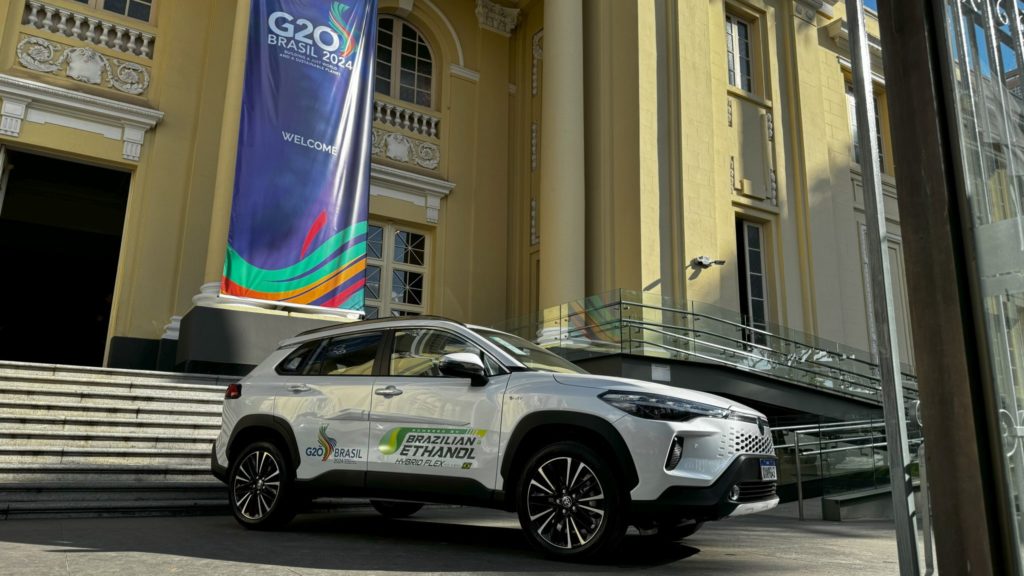
The conclusion of Brazil’s presidency of the G20 was highlighted by high-level meetings held on November 18th and 19th in Rio de Janeiro. Brazil’s leadership during this term featured engaged and comprehensive discussions on some of the most pressing global challenges, including international security, global governance, climate change, and social inequalities. Throughout the year, the Brazilian Sugarcane and Bioenergy Industry Association (UNICA), in partnership with the Brazilian Trade and Investment Promotion Agency (ApexBrasil), the Ministry of Foreign Affairs, and Toyota do Brasil, showcased Brazil’s expertise in renewable energy production, consumption, and its commitment to innovation and sustainable agricultural practices. This initiative is part of the Brazilian Sugarcane Ethanol project.
As a result of a year of in-depth discussions, representatives from the 19 member states, along with the European Union and African Union signed a comprehensive declaration that calls for robust and inclusive economic growth, the promotion of sustainable development, and intensified efforts to combat climate change. The declaration also emphasizes the urgent need for strengthened global governance, greater investment in public health systems, and the implementation of concrete initiatives to eradicate hunger worldwide.
Furthermore, in Rio de Janeiro, the leaders reaffirmed the critical importance of transitioning to clean energy to secure a more sustainable future, enhance energy security, and reduce carbon emissions. The world’s largest economies called for urgent actions to significantly increase the production and distribution of renewable energy, including biofuels, with a target to triple their capacity.
Brazil, a pioneer in bioenergy production and consumption, exemplified this commitment during this year of its G20 presidency. Throughout the year, UNICA and its partners played a prominent role in 75 official events, providing around 700 hybrid and flex-fuel vehicles powered by ethanol to transport delegations. This biofuel offers significant environmental benefits, reducing CO2-equivalent emissions by up to 90% when used in its nearly pure form, and by up to 15% when blended with gasoline. This initiative highlighted Brazil’s commitment to sustainability and its role as a global leader in bioenergy.
UNICA also closely monitored the agenda and working sessions of the G20 Energy Transitions Working Group, whose discussions played a pivotal role in shaping the G20 declaration. The group’s work was crucial to the recognition, in the final declaration, of the need to scale up sustainable fuels as a key strategy in the fight against climate change and to the recommendation of adopting mutually recognized methodologies and standards for assessing greenhouse gas emissions, marking a significant step toward global alignment and more effective climate action.
With the backing of Brazilian example and its lead in these past twelve months, the declaration sends a powerful message that a sustainable and inclusive energy transition is not only possible but imperative for securing a resilient future for generations to come.
About Sugarcane Ethanol Project
ApexBrasil and UNICA made public in 2008, through the Brazilian Sugarcane Ethanol partnership, a strategy to promote the image of sugarcane products abroad, especially Brazilian ethanol as a clean and renewable energy. In 2023, the two entities signed an agreement that provides for shared investments.
The sectoral project aims to influence the process of building the image of ethanol and other sugarcane derivatives among the main global opinion makers – governments and the media, as well as trading companies, potential investors and importers, NGOs and consumers.
About ApexBrasil
The Brazilian Trade and Investment Promotion Agency (ApexBrasil) works to promote Brazilian products and services abroad and attract foreign investments to strategic sectors of the Brazilian economy. In order to achieve its goals, ApexBrasil carries out several trade promotion initiatives aimed at promoting Brazilian products and services abroad, such as prospective and trade missions, business rounds, support to the participation of Brazilian companies in major international fairs, visits of foreign buyers and opinion makers to learn about the Brazilian productive structure, among other business platforms that also aim at strengthening the Brazil brand. The Agency also acts in a coordinated way with public and private players to attract foreign direct investment (FDI) to Brazil with a focus on strategic sectors for the development of the competitiveness of Brazilian companies and the country.
About UNICA
UNICA is the main representative body for sugar, bioethanol and other bioenergy products from mills located in the Center-South region of Brazil. Currently, it has more than 120 associated companies, which represent 60% of the sugar and ethanol produced in the country. UNICA has its headquarters in São Paulo and Brasília, as well as offices in the United States and Europe.



